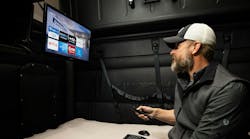The American Trucking Assns. (ATA) and the National Private Truck Council (NPTC) are supporting legislation to change a nearly 40-yr.-old law authorizing states to require for-hire motor carriers to register interstate operating authority and liability insurance in each state of operation.
In 1991, Congress introduced a base-state approach known as the Single State Registration System (SSRS) that operated as a clearinghouse for exchanging fees and registration information among states. Congress directed that DOT replace the SSRS with a single, online federal registration system known as Unified Carrier Registration (UCR) in 1995, but DOT never instituted the rulemaking necessary to make the system a reality. Thus far, Congress has failed to pass any of the legislation proposed to establish the UCR.
ATA recently drafted legislation addressing this for inclusion in the 2003 highway bill. If the bill becomes law, some private fleets currently without for-hire authority will pay new fees, while those that already have for-hire authority and pay fees under SSRS will actually pay less.
Critical support for this legislation comes from the Commercial Vehicle Safety Alliance (CVSA), primarily because the for-hire carriers have agreed not to repeal the carrier registration fees that are apportioned to the states. States would be allowed to use the UCR fees as their matching funds for federal grants under MCSAP.
What would the UCR look like? Under ATA's draft legislation, the UCR would be established to register all for-hire and private carriers, brokers and freight forwarders in a single system. For-hire and private carriers registered with a USDOT number effective January 1, 2002, would be grand-fathered into the UCR system. New registrants would pay a one-time fee of $300.
UCR would replace the USDOT number system, the for-hire authority (MC number) system, the SSRS, and the current DOT system for filing for liability insurance. Non-hazmat private fleets would not be required to meet the current federal minimum coverage of $750,000. DOT would be directed to prescribe what private carriers must file as evidence of financial responsibility.
The UCR plan envisions states entering into an agreement to exchange registration and insurance filings and to serve as a clearinghouse for fees. A Board of Directors, comprised of representatives from states and carriers, would establish procedures carrying it out.
The fee schedule would be based on the number of commercial motor vehicles operated by a carrier. A proposed schedule showed a range of $25 (1-10 vehicles) to $14,500 (2,001 or more vehicles). The monies raised would be designated for use by states in motor carrier safety programs, enforcement, financial responsibility and UCR administration.
Critical protection for private fleets would be provided by a provision that preempts additional state fees for the operation of motor carriers within a state. Since the faltering economy means that many states will have revenue shortfalls, they may find it tempting to seek additional revenues from non-voting out-of-state entities like interstate truck fleets. Preemption of additional state fees would keep this from happening.
NPTC supports the ATA legislation with two provisos: that a cap be set on the fees the UCR can raise annually, and that the definition of a commercial motor vehicle for the purpose of fee collections be limited to those units over 10,000 lb. If the UCR fees apply to vehicles under 10,000 lb., private fleets will take a disproportionately bigger hit in new fees because they operate a majority of the smaller commercial vehicles.
Gary Petty is President and CEO of NPTC. His column appears monthly in FLEET OWNER.


